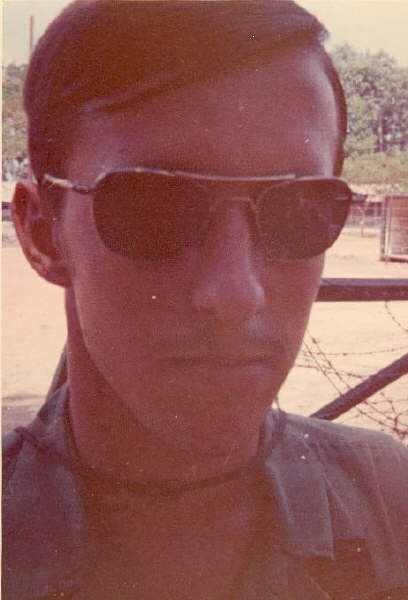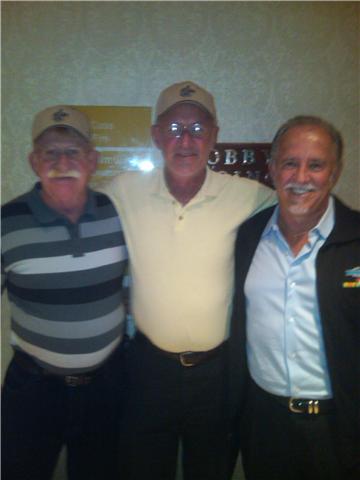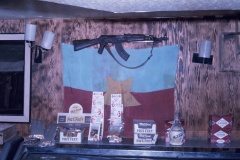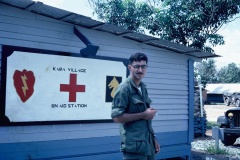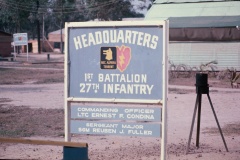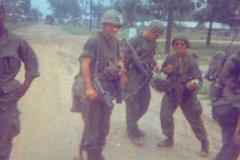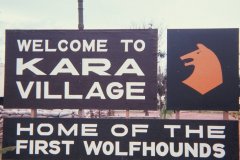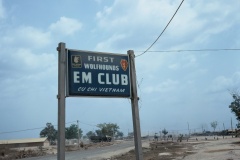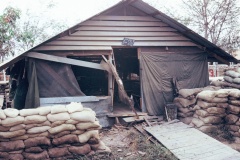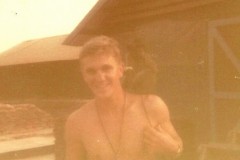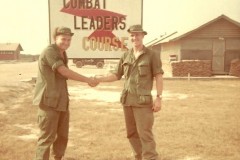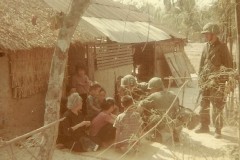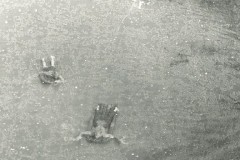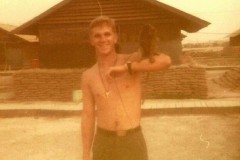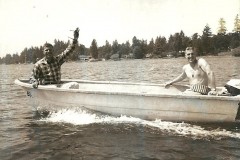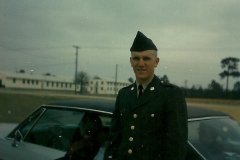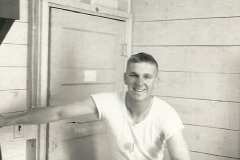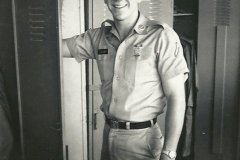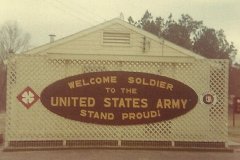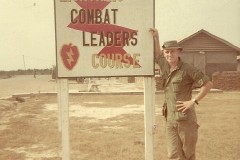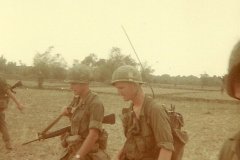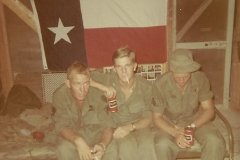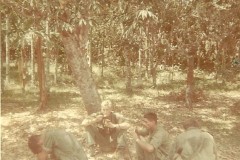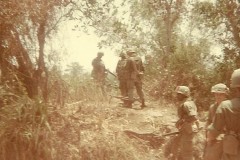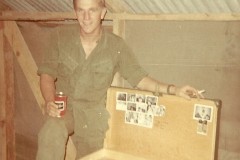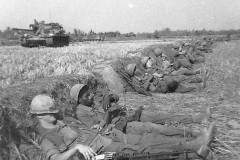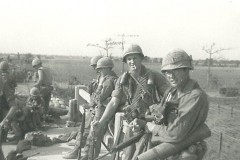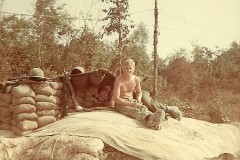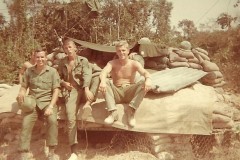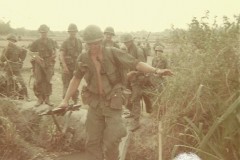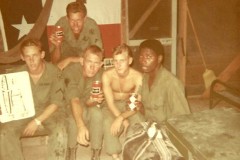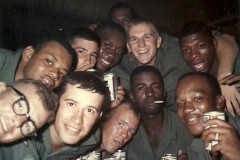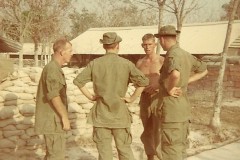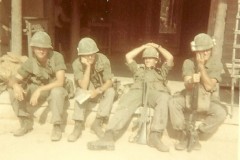Wolfhound Reflections: Aftermath of the Vietnam War
Burdette A Bond Sgt, 2/27 Inf. Wolfhounds
I am fortunate enough to be from, and still live in, a rural Missouri area. When I returned, everyone was very glad to see me, and that I had returned safely. This is an area that has provided men and women for every war since it was settled in 1839, and those who serve are treated with respect for that service. I’d say ‘honored’ but hey, it’s a very small town and we all know too much about each other for that. ; ) It was publicly known that I, and all the others from our county, served because our names and pictures were in the local paper, usually when we graduated from Basic, when we went to Viet Nam or wherever we were sent, and again when we came home. We never “told” because everyone knew about us, and asked our families about us regularly if they were acquainted at all with us or our families. I don’t remember if or when the first time was that someone thanked me – it was usually more of a “I’m sure glad you made it home, it’s great to see you back” than a thanks. I don’t think in this particular area we were treated much differently than were the WW1, WW2 and Korean vets, although how we reacted to coming home was a bit different in that we left and came home in much smaller groups and perhaps didn’t have the comaradire that perhaps many of those did. I will say that I am very grateful to be from this type of area, because I know from talking to fellow Wolfhounds that many did not have this type of welcome home – although they earned it a million times over.
B A Bond
Sgt, 2/27 Inf. Wolfhounds
David Hugus
Below is a little thing I wrote some years ago about why some Vietnam veterans feel the need to get together.
— David Hugus
Denigration and contempt are common reactions by the civil population to the members of the military during times of peace when soldiers’ sacrifices and pain can be safely ignored. But during times of conflict, the need for defenders of the nation is clear, their sacrifices well known and the heroism of the few is well publicized. The returning soldiers from World War II were greeted by the civilian population as heroes, saviors of the world and hailed by some to be members of the Greatest Generation. But a war weary country largely ignored the returning veterans of the Korean War. And in a way unprecedented in recent history, Vietnam veterans, even during a time of active conflict, were subjected to the active disdain, revulsion and outright hostility of the civilian population. Who can ever forget the strict instructions to carry a set of civilian clothes in your carry on baggage on the returning flight from Vietnam to the USA so you could change in the airport and try to avoid unpleasant incidents provoked by ignorant, misdirected anti-war protesters?
I suppose that the protesters were not even a significant minority, but the majority of the population, either through intimidation or indifference, choose not to oppose the vocal critics of the soldiers who were only the instruments of US foreign policy. Consequently, the Vietnam veteran returned from a frequently traumatic experience to at best a neutral environment and at worst to an actively hostile one as a result of serving his country. This lead to a feeling of isolation, especially to those who did not remain in the military with its closed bases and feeling of mutual support in the face of civilian revulsion. Veterans did not want to contaminate family members with whatever it was that caused the hostility so concerns, traumas, and the need for help were largely buried to avoid inflicting the prevailing outcast status onto loved ones.
In the face of this initial hostility and isolation now evolved into a universal indifference, the ability to reunite with those who have shared your experiences provides the single safe haven for the Vietnam veteran. There is no need to explain what you went through. They understand. There is no need to describe the terror, the ever present anxiety, the overwhelming feeling of failure when a friend is killed. They know. There is no need to try to grapple with the population’s hostility and rejection. They have coped. You can just exist in an environment of understanding and acceptance. No explanations required, no justifications needed, no questions asked.
This comfort, limited as it is, does not come free. You need to recall the experiences that produced this bond. You need to reflect on things long buried and perhaps better left unremembered. You need to recall those who did not return. You need to see the physical evidence of war’s ravages on the bodies of your fellows. You need to deal with experiences that are brought into sharper focus than is comfortable. You need to sympathize with the destroyed relationships, the addictive behaviors, the failures to cope. You need to support those who have had greater difficulties accommodating to the hostility and indifference. You may not judge, you can only accept.
It is a measure of the powerful need for acceptance and understanding that all of these negative influences do not deter Vietnam veterans from coming together. No one else understands. No one else accepts. No one else forgives. We need that and no one else can or will provide it.
What was the immediate reaction from your friends and family upon your return from Vietnam?
Friends and family had questions about why we were in Vietnam and what it was like. Obviously, there was no hostility, but also there was no credit given for service. Mostly just a focus on the rationale behind our government's decisions which, equally obviously, I was not well equipped to answer. Part of that was because I had no visibility into the thinking at the highest levels of our government. Partly that was because our government's behavior was just hard to explain. Still is.
How long was it before someone thanked you for your service?
I am not really sure. I suspect that it was about 2004 or so after the country started thanking service members and veterans for service in Iraq and Afghanistan. Vietnam vets were belatedly included in the general good feeling about those who served in those conflicts. But it was reasonably clear that Vietnam veterans were an afterthought. The focus was on the people currently serving, not those who had served in Vietnam.
When did you publicly make it known you had served?
I stayed in the army after Vietnam so I didn't have to integrate into a civilian world. People who knew me obviously knew I was in the army, but I certainly did not advertise that fact. In the 23 years that I was in the army, I wore my uniform in public exactly once. That was in 1982. I suspect that you have heard several times that returning Vietnam servicemen and women were told to carry civilian clothes with them on the returning aircraft. Because the flights were military charter, we had to be in uniform to fly. However, we were strongly advised to change into civilian clothes as soon as we reached the States. The intention was to try to minimize unpleasant airport scenes where soldiers were spit on and had eggs and fruit thrown at them.
What were some of the ways you were treated differently than WW1, WW2, and Korea vets?
As I note in the attachment, World War II veterans were hailed as saviors of the country and world and called the greatest generation. When I joined the army in 1966, Korean veterans were mid-career with about 15 years service. They didn't talk about their treatment much, but when they did they noted two things. The first was that the country largely ignored them and the conflict. They generally called Korea the forgotten war. The second thing that they noted was the unfriendly treatment they received from the "old soldiers" in the army. Because of the rapid increase in the army' size and the heavy casualties, particularly in the early part of the war, soldiers who served in Korea often received rapid promotions. Some of my acquaintance made SFC in the two years they were in the army, most of the time in Korea. But when they returned to the States, they were often faced with a review board composed of senior NCOs (read that WWII veterans) who asked them garrison questions about ceremonies and garrison functions. Every wrong answer cost them a stripe. A lot of these soldiers faced the board as mid-level or senior NCOs. Many left the boards as E4 or below. So Korea vets were ignored by the public and had their combat service disrespected by the people in the army who did not serve in Korea.
But to my knowledge, the only time in our history where active duty and recently returned veterans were actively reviled and castigated for their service was Vietnam. I believe that a lot of the emotional problems, drug and alcohol and relationship difficulties encountered by Vietnam veterans stemmed from their treatment after returning, rather than the service itself.
Easy's Speech May 26, 2016
Easy's Reading of Names/Wreath Laying Ceremony Speech, May 26, 2016
Easy’s Sacramento City Library Interview
Easy’s Sacramento City Library Interview by Christie Dentry
Anthony Tascione, Medic HHC 1/27 1967-68
In response to your inquiry regarding the conditions and treatment which I personally experienced upon returning from a year serving in Vietnam; mostly as a medic in an infantry platoon with the Wolfhounds, I offer the following.
Unlike most returning veterans, I didn't return via a commercial airline flight, because of the on-going Tet Offensive and a ban on commercial flights I came home on a military transport plane by way of Manila-Anchorage, Alaska- Dover Air Force Base (Delaware) then the following day by plane to Fort Dix, New Jersey where within two days I was discharged. I might add that the cargo plane had five passengers and the remains of some thirty-three servicemen who were killed in action, so there was no elation when the plane cleared the runway in Saigon and the balance of the flight was a pretty somber experience.
We were not allowed off the plane in Manila as it was a refueling stop and upon landing in Alaska we were restricted to the tarmac surrounding to the plane. My recollections were standing on the tarmac on a cool but sunny day in June with snow covered mountain peaks in the distant and looking up the cargo way at the neatly arranged metal caskets, each covered with an American flag. On landing at Dover Air Force Base after what I believe was about a thirteen hour flight we were told to remain on the plane until the remains were removed.
My initial experience both at Dover and the next day at Fort Dix was feeling disconnected and out of touch. No one was particularly friendly at the NCO Club where I went the first night for a beer. The following day upon arrival at Fort Dix, the first thing I experienced was some acting E-5, (which was the same rank as me) telling me I didn't look like a soldier, demanding my military Identification card and threatening me that unless I got a military haircut I would not be allowed to process out of the military. Welcome Home!
While my first reaction was to tell the guy to fuck off since we were the same rank and he was merely an acting E-5, I remembered I had two I.D. cards so I complied, gave him one then proceeded to process out with the other returning soldiers all of whom were returning from Germany and there I was with my short sleeve Khakis, Class A's that I had already been wearing and sleeping in for 4-5 straight days. Once a draftee, always a draftee, I guess.
I might add that when I was officially processed out I did have the opportunity to tell the acting E-5 to enjoy his military service along with a few other choice comments not fit for publication. Just sort of reinforced my prior stateside military experience.
A hometown buddy drove down from NY to pick me up as my family didn't own a car and we then proceeded to get lost on the way back north to NY, somewhere in Newark, N.J.
Now this was just about two months after Dr. Martin Luther King Jr... was killed in Memphis and driving into inner city Newark and being white was not very cool, but I did see the devastation in the aftermath of the riots that followed Dr. Kings murder, sort of like what I witnessed the first couple of days after the Tet Offensive began. We pulled into a gas station and some guys started giving me a hard time when I got out to asked for directions, but an older man came out of the gas station office told them to "chill out, can't you see the man is just back from Nam." He gave us proper directions, I thanked him and we rather quickly to get back to the highway going back to NY. As an observation, we all knew in Vietnam that Dr. King had been murdered, but there was still that disconnect with all things happening in the U.S. probably because in Vietnam it was about survival and most news details from home was suppressed by the military.
I met up with my parents, tried to hook up with my former girlfriend who had dumped me while in Vietnam to no avail and visited two families of guys I had seen during my last couple of weeks in Vietnam to assure them that they were well. I guess people said things like welcome home and how was it, but I just felt totally disconnected and wary. Drank pretty heavily the first couple of weeks, was irritable, and stayed in my room and little contact with anyone.
After about a month my Mother started nagging me (S.O.S.) to get a job, so I started working in a grocery store, waiting on customers and making deliveries. It wasn't easy, the owners were wary of me and having inane social conversation with customers was very difficult for me. I never told people I was in the army and avoided discussing being in Vietnam. People occasionally talked about it, and mostly all the older people in the neighborhood was supportive of what America was doing there. I was ambivalent.
After a couple of months, I decided to go back to college, enrolling at a local community college where there was a fair amount of returning Vietnam veterans. Mostly, we kept to ourselves, wore fatigue jackets as part of our new college uniform, smoke dope and drank. Still even within that group, there wasn't much, if any recounting of any of our personal war experiences. I tried to engage a couple of girls on campus, but they were much younger than me and sort of looked at our group of veterans as a bit strange. Still no one was vocal in opposition to the war or called us murderers. If they had those thoughts they kept them to themselves or maybe I just wasn't listening. After three semesters I obtained my associates degree and transferred to a four year college in Staten Island, in NYC, a very, very conservative community. By this time I looked like an older version of everyone else going to school, long hair and a beard and it was there where I got my first real taste of hostility, not because of being a Vietnam guy, but because of the long hair and beard. People were really starting to pick sides on the issue of America's involvement and of course anyone with long hair was perceived to be a draft-dodging, anti-war type. The more I was confronted by people who categorized me as someone who was anti-war, the more I assumed that role, participating in anti-war demonstrations and marches culminating to the large demonstration in Washington where I marched with the Vietnam Veterans Against the War. Lots of abuse and name calling, but I think what formulated my attitude was as much my belief of the futility of the war's direction and ineptitude of the leadership, and how I was treated because I had long hair and a beard.
I finished college with a degree in American History, received a scholarship to graduate school where I obtained my Masters Degree again in American History, then entered the work world taking the first job offered which had nothing to do with my education. I worked with people, mostly poor, minorities, some veterans, many with drug and alcohol problems and found the work rewarding. If fact, I spent my entire career working in human services, a way to give back for having the good fortune to survive and be functional after Vietnam.
Best Regards,
Anthony Tascione Medic
HHC 1/27 1967-68
Bill Allen, A Co 1st Bn 27th Inf Reg 25th ID
My family cried joyously, as soon as they saw me. And, I did too.
Friends and acquaintances asked questions, to which I shrugged, and left unanswered. I missed, terribly, the men I left behind and also those who came home with me, after we split-up at LAX for our home destinations.
I kept everything to myself for 40yrs, then one morning I got on the computer and up popped Easy Smith's web site. I was with Easy that day of Sept. 4th, 1967 when he was hit. All those years I thought he was most likely KIA. I was hit later on that day and lost all contact. Needless to say, I e-mailed him and we've stayed in contact since. He and Doris are beautiful and wonderful people.
I met Easy and his beautiful wife, Doris, at Fort Hood, Texas in about 2008, they both explained how important our reunions are and that it would help me get through life easier, after seeing some of the men. And, it has helped, greatly, except when the reunion is over, after getting home a person is sad for a few days.
Since I never talked about my service, the first person to thank me for my service was a man named Scott Nooncaster in July, 2008. He saw a picture of my wife and I, at the time of the picture, I had a 25thID patch on a jacket I was wearing.
The only thing I remember showing I was in the military was when I turned 62yrs old I took advantage of the free Texas vehicle license plate, indicating Purple Heart. Don't know the level of my accomplishments, in life, but I can say that service to my country and knowing my Wolfhound Brothers is at the very top of the list.
Hope my rambling hasn't bored you and there is something you can use.
Best regards,
Wolfhounds Forever/ No Fear
Bill Allen
Calvin Neptune, III Medic HHC, 2/27 1967
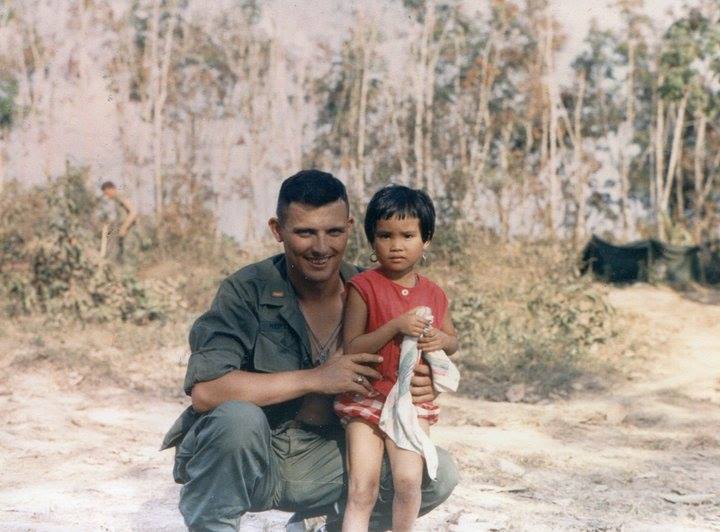
This is my experience returning from Wolfhound service in Vietnam:
What was the immediate reaction from your friends and family upon your return from Vietnam?
First, I returned to the USA from Vietnam in 1967 differently than most. I was wounded and sent to an Army hospital in Japan for a few months for treatment. I then returned to the USA and completed treatment at Fitzsimons General Hospital (Army) in Aurora, Colorado. I received excellent treatment from the medic who crawled to me in Vietnam to completion of treatment in Colorado. I was always treated with kindness and respect. Soon after arriving at Fitzsimons GH I was sent home on a one month convalescent leave. My home was Pittsburg, Kansas, a town in southeast Kansas of 22,000. In addition there was a college community the (Pittsburgh State University) of 7,000. I had been commissioned in the Army a second lieutenant by way of ROTC from that college the year before. My family and friends were heart-warmingly happy to see me come home. There was curiosity about what it was "really like" over there. Most men of my parents’ generation were WWII and/or Korean War vets and they were uniformly welcoming. There was a small anti-war faction on the college campus but it truly was insignificant. Remember this is late 1967.
How long was it before someone thanked you for your service?
During the first week of my convalescent leave I was asked to speak to the local Kiwanis group, They were welcoming, thanked me for serving and presented me a plaque in appreciation of my service. The theme frequently expressed was, "we're happy you are home as opposed to the "thank you for your service".
When did you publicly make it known you had served?
It was publicly known in my hometown before I got home. There had been a couple of hometown newspaper articles about me being in the Wolfhounds, before I was wounded and then a couple after I was wounded. After being initially released from active duty in 1968 I enrolled in law school. I was the only Vietnam vet in the school. At the beginning of one class early the first semester the professor, a WWII vet, announced to the (large) class I was a combat vet having returned from Vietnam. I received a round of applause. This was September 1968. I had several classmates who were supportive of my service. Most fellow students had no response noticeable. There were no negative experiences.
What were some of the ways you were treated differently then WW1 WW2 and Korea vets?
I had no experiences of being treated differently than veterans of WWI, WWII or the Korean War.
I am aware many, many veterans were treated shamelessly when returning from Vietnam. I know this often started in gateway city airports where there were vicious, vile attacks by organized radical anti-war groups. I am aware many veterans were shunned or discriminated against, particularly in employment and VA health care following their return and identification as Vietnam vets. As a sidebar, I would say those of my generation who did not support the Vietnam vets and who even acted against them, in the main, are sorry now they did so. Our challenge (we Vietnam vets) is forgiveness---and that is for us. I am tired of carrying the weight of anger and hatred. Otherwise, I believe this shame and sorrow has been expressed by the anti-Soldier, Vietnam War protesters, as a generation, in the consistent, active support of veterans starting with Operation Desert Storm and continuing to this day. I have heard or seen countless times during this modern day period, "I am against our involvement (Iraq, Afghanistan) but I support the troops". What a change.
One of the sadist consequences of the Vietnam War was it turned my (our) generation against itself. Many open psychological wounds remain in the hearts of the warriors who were doing their duty for the country.
Easy, hope this helps. I know my experience is atypical of so many horror stories our brothers have to report.
After one year in law school and just feeling out of place (haven't we heard that many times from Vietnam vets) I returned to active duty in Vietnam and remained until retiring in 1992. The Army was home. The Soldiers were, and are, my brothers and sisters. I salute the Vietnam vets who left active duty after their one combat "hitch" and persevered in the civilian world, against great odds.
Should you want further information let me know. Best wishes with your studies.
Wolfhounds forever,
Calvin Neptune
Kermit Schayltz
i appreciate the opportunity to tell my story and maybe get it off my chest and possibly one of the many ghosts will go away. so in that regard, thank you.
my honest reason to join and go to vietnam was to serve my country, knowing if i made it back alive i would be justly rewarded. i returned in october of 1970 at the age of 21, having served in both 68 and 69 with the 1/27 battalion of wolfhounds and 70 with the 25th infantry in places like cu chi, iron triangle, boi loi woods, hobo woods, trang bang, duc hoa, dau taing, tay nihn, nui ba den, and of course into cambodia.
to be honest, it was a shock, to be in SFO, in my Class A's, CIB and other medals i had been awarded attached, with not one soul looking at me, and actually seemingly making an effort to avoid me. i really never felt so alone, unappreciated, and stupid. i stood in the shadows and watched davy jones of the monkee's parading up and down the concourse with all the groupies adoring him and thought to myself....kermit....apparently you have made a very bad error in your expectations of a just reward.
in boston's logan airport i experience the same thing and actually ran out of there and started hitch-hiking to northern vermont where i was sure friends would warmly greet me. a truck driver stopped and asked where i was going and told me he would be able to take me to white river junction which was still 3 hrs from my destination but i accepted with much appreciation.
from there i was able to phone a high school classmate that agreed to come get me if i paid for the gas. i agreed and he did. neither the truck driver, nor my classmate, asked me questions or thanked me. as soon as i arrived where i was raised, i removed my uniform, never to wear it again.
in closing, i just realized, 10 days ago was the 43rd anniversary of my return, no wonder i missed it.
best regards,
kermit schayltz
